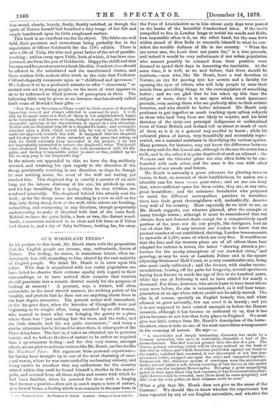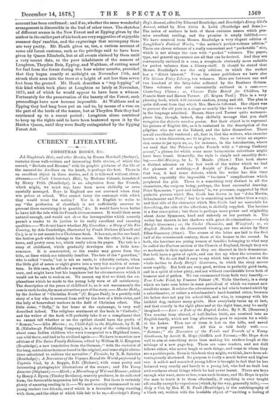OUR WOODLAND TREES.*
Ix his preface to this book, Mr. Heath starts with the proposition that the English people are intense, nay, enthusiastic, lovers of Nature. The feeling, he states, is sometimes latent, often un- developed, but still, according to him, shared by the vast majority of English people. We think Mr. Heath is in error upon this point. Who that is acquainted with our rustic population can have failed to observe their extreme apathy with regard to their surroundings, or to have noticed their surprise that tourists should penetrate into a remote district merely for the purpose of looking at scenery ? A peasant, nay, a farmer, will often enumerate, in the most absurd manner, the striking points of his locality, and protest that he does not see anything about them in the least degree attractive. The present writer well remembers, in the by-gone days, when the beauties of Glengariffe were just beginning to be sought after, being accosted by an old woman, who wanted to know what was bringing the gentry to a place where there was "just nothing but the trees, and the rocks, and the little islands, and the sea quite convanient ;" and many a similar utterance has he listened to since then, in other parts of the Three Kingdoms. The fact is, it takes an educated eye to perceive beauty, and we believe the love of nature to be rather an acquired than a spontaneous feeling : and for this very reason, amongst others, we are glad to welcome writers like Mr. Heath, and books like his Woodland Trees. His argument from personal experience— his having been brought up in one of the most charming of semi- rural towns, where he was surrounded by enchanting scenery, and being unable to recollect that any enthusiasm for the country stirred within him until he found himself a dweller in the metro- polis, and severed from all those sights and scenes with which he had been familiar, when he yearned for them with a longing that became a passion—does not so much argue a love of nature, as a love of home, a feeling which is as common to the man born in Our Woodland Trees. By Francis G. Heath. London : Sampson Low and Co. the Fens of Lincolnshire as to him whose early days were passed on the banks of the beautiful Cumberland lakes. If the rustic compelled to live in London longs to revisit his woods and fields, how impossible often is it, on the other hand, for the man born within sound of Bow Bells to reconcile himself to what he con- siders the terrible dullness of life in the country. "What the eye never saw, the heart does not yearn for," is a true proverb, and indeed it would be very unfortunate if our urban population who cannot possibly be released from their position were doomed to spend their days in lamenting the inevitable. At the same time, it is well, as we said before, that there should be teachers,—men who, like Mr. Heath, have a real devotion to Nature, an eye for peering into her secrets and a faculty for opening the eyes of others, who will help people to raise their
minds from grovelling things to the contemplation of something better ; and we are glad that he has taken up this time the subject of trees, since it is one upon which much ignorance prevails, even among those who are perfectly alive to their artistic beauties, and who should be better informed. Mr. Heath only professes to put together as much teaching upon sylvan subjects as those who lead busy lives are likely to acquire, and his brief sketches of the sixty-one principal indigenous or acclimatised trees of Great Britain and Ireland tell us about as much of each of them as it is in a general way needful to know ; while his coloured plates of leaves, very beautifully and accurately repre- sented, are a material assistance in identifying the various species. Many persons, for instance, may not know the difference between the wavy and the fiat-leaved oak, although in the one the acorn has a stalk, and in the other it is quite deprived of such an adjunct ; the Western and the Oriental plane are also often liable to be con- founded with each other, and the same is the case with other denizens of our woods and forests.
Mr. Heath is naturally a great advocate for planting trees in towns, in fact, on account of their healthfulness, he makes out a tolerable case for trees versus poor-rates ; and no one can deny that, where sufficient space for them exists, they are, at any rate, great beautifiers ; and the unknown benefactor who proposes to assist the different metropolitan parishes to introduce trees into their great thoroughfares will, undoubtedly, deserve very well of his country. Most especially do we wish to see, as Mr. Heath suggests, our wharves planted, after the example of many foreign towns ; although it must be remembered that our
climate does not demand shade except for a comparatively small portion of the year, nor do our people, like foreigners, lead an out of-door life. It may interest our readers to know that the present number of our established, thriving, London trees amounts to upwards of 3,200, some of which are very fine. It would seem that the lime and the western plane are of all others those best adapted for culture in towns, the latter "showing almost a pre- ference for the smoky atmosphere of our crowded cities," and growing, as may be seen at Lambeth Palace and in the square adjoining Stationers' Hall Court, to a very considerable size, being also most easily cultivated ; and the former, with similar recom- mendations, bearing off the palm for longevity, several specimens having been known to reach the age of five or six hundred years, while the one at Fribourg is said to have existed for nearly a thousand. For those, however, who are in haste to have trees where none were before, the elm is recommended, as it will bear trans- plantation at an age when others could not be safely moved. The elm is, of course, specially an English homely tree, and when allowed to grow naturally, few can excel it in beauty ; and yet it is not supposed to have existed amongst us before the Roman invasion, although it has become so endeared to us, that it has given its name to not less than forty places in England. 1Ve must give one little extract from Mr. Heath's description of the horse- chestnut, since it tells us one of the most marvellous arrangements in the economy of nature. He says :—
"A remarkable and deeply interesting discovery was made by a German naturalist, who once, in midwinter, dissected a bud of tho horse-chestnut. The bud was not greater than the size of a pea. The brown, gummy covering, which will be always noticed on the buds of this tree in winter, and which furnishes protection against our frosts to the tender, unfolded leaf, consisted, it was discovered, of not less than seventeen scales, wrapped one upon the other and cemented together. Underneath this elaborate system of envelopes were the microscopic forma, nursed under a soft, downy covering of four leaves, in the centre of which was the incipient flower-spike. Bringing a great magnifying power to bear upon these tiny bud-contents, it was discovered that sixty- eight flowers could be counted, nuts [here must be some misprint], and that oven the very pollen on their stamens could be seen."
What a pity that Mr. Heath does not give us the name of the German We should like to know whether the experiment has been repeated by any of our English naturalists, and whether the
account has been confirmed ; and if so, whether the same wonderful arrangement is discernible in the bud of other trees. The sketches of different scenes in the New Forest and at Epping given by the author in the earlier part of his book are very suggestive of enjoyable summer days' rambles, and the engravings that accompany them are very pretty. Mr. Heath gives us, too, a curious account of some old forest customs, such as the privilege said to have been given by Queen Elizabeth, but at all events claimed by them until a very recent date, to the poor inhabitants of the manors of Loughton, Theydon Bois, Epping, and Waltham, of cutting wood for fuel from the forest during the four winter months, provided that they began exactly at midnight on November 11th, and struck their axes into the trees at a height of not less than seven feet from the ground. Mr. Heath describes a " top-lopping " of this kind which took place at Loughton so lately as November, 1873, and of which he would appear to have been a witness. Fortunately for the preservation of the beauty of the Forest, such proceedings have now become impossible. At Waltham and at Epping they had long been put an end to, by means of a ruse on the part of the lords of the manor, but at Theydon Bois they had continued up to a recent period ; Loughton alone contrived to keep up the rights said to have been bestowed upon it by the Maiden Queen, until they were finally extinguished by the Epping Forest Act.







































 Previous page
Previous page